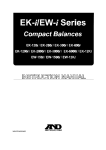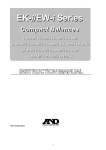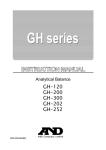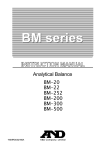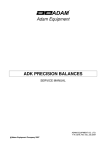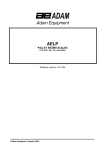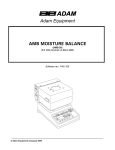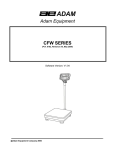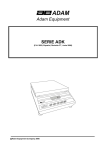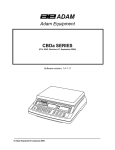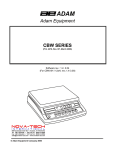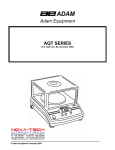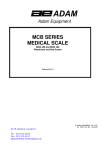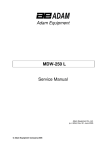Download Adam Equipment ADK SERIES
Transcript
Adam Equipment ADK SERIES (P.N. 2693, Revision F7, January 2006) @Adam Equipment Company 2006 1 CONTENTS 1.0 INTRODUCTION.......................................................................................................2 2.0 SPECIFICATIONS ....................................................................................................2 3.0 INSTALLATION.........................................................................................................3 3.1 3.2 3.3 3.4 3.5 UNPACKING YOUR BALANCE.............................................................................3 LOCATING THE BALANCE...................................................................................3 SETTING UP THE BALANCE................................................................................4 SHIPPING PROTECTION .....................................................................................5 VOLTAGE SELECTION ........................................................................................5 4.0 KEYPAD ...................................................................................................................6 5.0 OPERATING THE BALANCE ...................................................................................7 5.1 5.2 5.3 6.0 6.1 6.2 6.3 6.4 6.5 CALIBRATION.......................................................................................................7 CALIBRATION CHECK .........................................................................................8 CHANGING CALIBRATION MASS VALUE ...........................................................9 WEIGHING .............................................................................................................10 SIMPLE WEIGHING ............................................................................................10 WEIGHING-IN .....................................................................................................10 WEIGHING-OUT .................................................................................................11 DEVIATION WEIGHING ......................................................................................11 BELOW PAN WEIGHING ....................................................................................11 7.0 WEIGHING UNITS..................................................................................................12 8.0 WEIGHING MODES ...............................................................................................12 8.1 8.2 8.3 PARTS COUNTING.............................................................................................13 PERCENTAGE WEIGHING.................................................................................13 ANIMAL WEIGHING............................................................................................14 9.0 USER PARAMETERS ............................................................................................14 10.0 RS-232C INTERFACE ............................................................................................16 10.1 10.2 10.3 RS-232C SPECIFICATIONS ...............................................................................16 DATA OUTPUT MODES......................................................................................16 COMPUTER INTERFACE ...................................................................................17 11.0 CARE AND MAINTENANCE...................................................................................18 12.0 TROUBLE-SHOOTING...........................................................................................19 13.0 REPLACEMENT PARTS AND ACCESSORIES........................................................20 14.0 SERVICE INFORMATION .........................................................................................20 @Adam Equipment Company 2006 1 1.0 INTRODUCTION ADK Series includes high capacity electronic balances. This series offers high-quality and precision balances that delivers accurate results. This manual covers models ADK-10 and ADK-20. This series of balances is the product of years of research, design, development and in-field testing. Every care has been taken during the manufacturing process of these durable balances to ensure that they will perform accurately and reliably for many years. The balances have under-hook for below weighing as an option. 2.0 SPECIFICATIONS ADK 10 ADK 20 Capacity 10 Kg 20 Kg Readability 0.1 g 0.1 g Repeatability 0.1 g 0.1 g Linearity ±0.2 g ±0.2 g Temp. Coefficient 10 ppm/ºC 10 ppm/ºC Calibration Mass 10 Kg 20 Kg Common Specifications: Power Operating Temperature Pan Size Overall Size Net weight 230VAC, 50/60Hz, 20 Watt, (115VAC, 50/60 Hz. optional) 5ºC to 40ºC 300 x 340 mm 11.8 x 13.4 inches 314 x 460 x 164 mm. 12.4 x 18.1 x 6.5 inches 18 Kg / 39.6 lb. @Adam Equipment Company 2006 2 3.0 INSTALLATION 3.1 UNPACKING YOUR BALANCE Remove the balance from the carton carefully. It is recommended to keep the packaging materials for storing or transporting again, if necessary. In the carton you should find this balance together with: 9 9 9 9 9 9 3.2 Pan Pan support A spare fuse (0.5) A plastic plug A power supply cord This instruction manual LOCATING THE BALANCE • The scales should not be placed in a location that will reduce the accuracy. • Avoid extremes of temperature. Do not place in direct sunlight or near air conditioning vents. • Avoid unsuitable tables. The table or floor must be rigid and not vibrate. • Avoid unstable power sources. Do not use near large users of electricity such as welding equipment or large motors. • Do not place near vibrating machinery. • Avoid high humidity that might cause condensation. Avoid direct contact with water. Do not spray or immerse the scales in water. • Avoid air movement such as from fans or opening doors. Do not place near open windows or air-conditioning vents. • Keep the scales clean. Do not stack material on the scales when they are not in use. @Adam Equipment Company 2006 3 3.3 SETTING UP THE BALANCE • The ADK Series comes with a stainless steel platform packed separately. • Level the balance by adjusting the four feet. The balance should be adjusted such that the bubble in the spirit level located on the top of the base, is in the centre of the level. • Place the platform in the locating holes on the top cover. • Do not press with excessive force as this could damage the load cell inside. • Place the pan on top of the pan support. • Plug in the cable into the main power supply and press the power switch located at the rear of the base to ON to switch on the balance. An arrow will appear in the display and will keep moving across the icons marked below the display. Please note that the display of the balance will not be on till the [On/Off] key is pressed even though the balance is switched on. • Press the [On/Off] key to switch on the display. A self-test is followed. At the end of the self-test “0.0” will be displayed, if the zero condition has been achieved. An arrow will appear above the default unit which is g. • The balance should be warmed up for at least one hour before using. @Adam Equipment Company 2006 4 3.4 SHIPPING PROTECTION This ADK balance has protection for the weighing mechanism that must be removed before the balance is used. • To remove the shipping protection, remove the pan then place the balance on the table upside down. Shipping Protection • Remove the cover over the protection screw by loosening 2 screws. Weigh below Attachment ADK BALANCE 3.5 • Remove the protection screw, place in a safe place in case it is needed for shipping the balance again. Replace the cover. VOLTAGE SELECTION • This balance now includes a switch to select the mains voltage. Verify the switch is set to the correct voltage for your area. • The switch is located on the back panel under a small cover. Remove the cover on the rear of the balance. • Remove the cover by removing the small screws on the cover. Do not remove the screws on either side of the cover. • Select either 110V or 220V as required. The 110V position is for power supplies from 110 - 120VAC and the 220V position is for voltages of 220 – 240VAC. RS-232 connector @Adam Equipment Company 2006 110/220V Select 5 Fuse 1/2A On/Off 4.0 KEYPAD Keys Functions [On/Off] To switch on and off the balance display [Print] To send and receive data over RS-232 interface Also used to decrease the value during setting up the parameters [Cal] To calibrate the balance [Mode] To select the modes and units Also used to increase the value during the setting up the parameters [Tare] To Tare the balance. Also used during Calibration @Adam Equipment Company 2006 6 5.0 OPERATING THE BALANCE 5.1 • To get the most from the balance, it should be warmed up for at least one hour and calibrate before using. • Don't use sharp articles (such as a pencil) to touch the keys. Use your finger only. • Always place samples to be weighed on the pan gently. Never drop them on the pan. • To weigh a magnetic material, a shield should be put on the pan to keep the magnetic material 3-5cm away from the pan or you can use the below pan weighing facility for such purpose. CALIBRATION Your balance should be calibrated when it is to be used. It is necessary to recalibrate the balance when it is moved to another place or after a period of use (about 30 days). • Calibration Mass required: • Press the [On/Off] key to turn the balance on. • Display will show a self-check mode. • After about 5 seconds, zero will be displayed. • Warm up at least one hour before calibrating. • Make sure that nothing is on the pan. • Press [Tare] key to zero the display. • Display will show “ 0.0”. If the display is not zeroed, press the [Tare] key again. • Press the [Cal] key. • Display will show “CAL - - 0” • Press [Tare] again and wait for few seconds. Display will show @Adam Equipment Company 2006 7 ADK-10: 10kg ADK-20: 20kg “CAL - - F” 5.2 • Place the suggested calibration mass on the pan gently (Take ADK-20 for example). Allow a few seconds for stability. • Press [Tare] again. • It will show “CAL End” and then “20000.0” will be displayed. • Remove the mass from the pan gently. • Display will show “0.0”. The balance is now in the weighing mode. • Note: if “CAL -no” is displayed during calibration, it means that the calibration has failed. • Check if the calibration mass is wrong. Try calibrating the balance again using a correct calibration mass. • If it is still a problem then check if the value displayed is much more or less than the actual weight. If the difference is more than 2% of the calibration weight value, adjust the span potentiometer as shown below. • Remove the plastic plug on the right hand side of the balance. There is a hole through which you will find an adjustable potentiometer. Use a small screwdriver to adjust the value displayed. To increase the value displayed, turn the screw on the potentiometer clockwise. To decrease the value displayed, turn the screw anti-clockwise. • When the value displayed is approximately the actual weight, press the [Cal] key to calibrate the balance again. CALIBRATION CHECK • To verify whether the balance is calibrated or not, place the calibration mass on to the centre of the pan gently when “0.0” is displayed. • If the correct weight is displayed, it is calibrated correctly. Remove the weight from the pan. • If the value displayed is more or less than ± 0.1g from the standard repeat the calibration procedure. @Adam Equipment Company 2006 8 • 5.3 If it still displays “CAL -no” send the balance to the service centre. CHANGING CALIBRATION MASS VALUE If you do not have the accurate calibration mass, you can change the value of the calibration mass by using the following procedure. This will enable to carry out the calibration of your balance accurately in absence of the proper calibration mass. Procedure • Turn the balance on by pressing [On/off] with the pan empty. • Press the [Cal] key. “CAL - -0” will be displayed. • Press [Cal] again. “20000.0” will be displayed. • Use the [Mode] key to increase the value up to 20001.5 or use the [Print] key to decrease the value to 19998.5. The value will change by one digit every time these keys are pressed during setting up. • When the desired value is displayed (for example, 20000.8) press [Tare]. “CAL - -0” will be displayed. • Press [Tare] again. “CAL F” will be displayed. • Place the calibration weight weighing 20000.8 and press [Tare]. • First “CAL End” will be displayed and after some time “20000.8” will appear. • Remove the weight from the pan. It will display “0.0”. • Balance returns to the weighing mode. Note: The value “20000.8” will not be recalled next time you calibrate the balance. @Adam Equipment Company 2006 9 6.0 WEIGHING 6.1 6.2 SIMPLE WEIGHING • Make sure nothing is on the pan. • Place a sample on to the centre of the pan gently when "0.0g" is displayed. • Record the weight displayed when the arrow appears on Stab to indicate that the reading is stable. • Remove the sample. • When a container is to be used, the weight can be tared. Place an empty container on to the pan. The weight of the container will be displayed. Press the [Tare] key to cancel the weight, “0.0g" will be displayed. • Place the sample to be weighed in to the container. The weight of the sample will be displayed. • Record the value displayed when the stability indicator appears. • Remove all items on the pan. WEIGHING-IN To add material until the weight reaches a target • Place an empty container on to the pan. The weight of the container will be displayed. • Press the [Tare] key to cancel the weight. • Fill the sample into the container. The weight of the sample will be displayed as it fills the container. • Stop filling when the target weight is reached. • If required press the [Tare] key to cancel the total weight. • Repeat with the second material. @Adam Equipment Company 2006 10 6.3 WEIGHING-OUT To remove a certain amount of material from a full container 6.4 • Place a container with sample in it onto the pan. The weight of all things on the pan will be displayed. • Press [Tare] to cancel the weight, "0.0g" will be displayed. • Take material out of the container. • The negative weight of the sample taken out will be shown. • Stop when the target is reached. DEVIATION WEIGHING To measure the difference between a reference weight and an unknown weight 6.5 • Place a weight or a sample as a reference on to the pan. The weight of the reference will be displayed. • Press [Tare] to cancel the weight, "0.0g" will be displayed. • Remove the reference weight and place a part for comparison on the pan. • The difference between the comparison and reference weight will be displayed either in positive or in negative value. BELOW PAN WEIGHING If you intend to determine specific gravity or to weigh a sample immersed in a special liquid or atmosphere, you need below weighing. An optional weighing underhook is available for this purpose. @Adam Equipment Company 2006 11 PREPARATION • Under the balance you will find a cover with two screws on it. • Remove the cover by unscrewing the two screws, you will find a post for installing the underhook. • Fasten the underhook to the weighing mechanism. • Hang a wire through the hole. • Place the balance on a table with a hole in it or on a stand specially designed for under-hook weighing, and let the wire hang through the hole. • Suspend a suitable container on the other end of the wire or attach the sample directly to the wire. • If necessary recalibrate the balance with underhook and wire in place. • Now you can operate with below pan weighing. 7.0 WEIGHING UNITS There are 3 weighing units available with this range of balances- g, lb and oz. Simply press the [Mode] key to change the weighing results in the above units. The arrow will appear above the respective units to indicate the unit being used currently. By default, the balance will display the results in g. 8.0 WEIGHING MODES There are 3 weighing modes available with this range of balances- Parts counting, percentage weighing and animal weighing. When there is no weight on the pan and the display is showing zero, press the [Mode] key to scroll through the modes. @Adam Equipment Company 2006 12 8.1 PARTS COUNTING • Select the Counting mode by pressing [Mode]. It will display “0.”. • Press [Cal]. It will display “-10-“. You may change the sample size upwards by pressing the [Print] key or downwards by pressing [Mode]. The available options which are 5, 10, 15, 20, 25, 30, 35 and 40. • Place 10 (or the selected number) samples on the pan and press [Tare]. The display will show “10.” or the selected sample size. • Remove the samples from the pan. It will display “0.” • Place the number of unknown samples and the quantity will be displayed. • To change the weighing mode, simply press [Mode] and select the desired weighing mode. 8.2 PERCENTAGE WEIGHING • Select the percentage weighing mode by pressing [Mode]. It will display “0.00”. • Press the [Cal] key. It will display “-100-“. You may change the sample size upwards by pressing the [Print] key or downwards by pressing the [Mode] key. The available options which are 50, 100, 150, 200, 250, 300, 350 and 400 (50 to 400%). • Place a sample or a weight as 100% (or any other percentage value as above) reference weight on the pan and press [Tare]. The display will show “100.00” or the selected value. • Remove the sample from the pan. It will display “0.00”. • Place an unknown sample and the display will show the weight as a percentage of the reference weight. • To change the weighing mode, simply press [Mode] and select the desired weighing mode. @Adam Equipment Company 2006 13 8.3 ANIMAL WEIGHING It is difficult to weigh living animals accurately such as rabbit, which may move around a lot during weighing. The movement will not allow the display to show a stable weight and hence the true weight of the animal can not be determined. To overcome this problem, ADK series of balances are designed to offer animal weighing mode. The balance works out an average weight based on the force exerted by the animal over an extended period of time. Once the internal calculation is completed by the balance, it will hold the value and the arrow above Stab will appear. • Select the animal weighing mode by pressing [Mode]. It will display “0.0”. Note: g is the only weighing unit available in the animal weighing mode. • Place a cage or a container on the pan. The weight of the cage or container will be displayed. • Press [Tare] and the display will show “0.0”. • Place the animal into the cage or the container. After few seconds the net weight of the animal will be displayed and the stability indicator will appear. Note: User can reset the functions to suit weighing of different animals. See the Parameter Setting section for details. • To change the weighing mode, simply press [Mode] and select the desired weighing mode. 9.0 USER PARAMETERS The multi-function ADK balances are supplied with advanced software that allows the user resetting of the parameter settings to meet the individual user requirements. • Turn the display off by pressing [On/Off] key. • Press and hold the [Tare] key and then press [On/Off] while holding the [Tare] key. Release the [Tare] key. @Adam Equipment Company 2006 14 • Display check mode will be on showing all segments. Press [Print] when the display check mode is on. • Press [Mode] to scroll through the parameters from C1 to C7 and press [Print] to set a new value for a parameter. • Press [On/Off] to store the new settings. Display will be switched off. • Your balance will work with the new parameter settings when you turn on the display again by pressing [On/Off]. Parameter C1 Description No. of times of sampling in the animal weighing mode C2 Width of the motion permitted in the animal weighing mode C3 Zero track and tare C4 Baud rate C5 Data output mode (8-N-1) C6 Sound to confirm pressing of a key C7 Stability bandwidth @Adam Equipment Company 2006 Settings C1 – 0 (8 times) C1 – 1 (16 times) C1 – 2 (32 times) C2 – 0 (1000 digits) C2 – 1 (2000 digits) C2 – 2 (5000 digits) C2 – 3 (10000digits) C3 – 0 (ON) C3 – 1 (OFF) C4 – 0 (2400) C4 – 1 (1200) C4 – 2 (4800) C4 – 3 (9600) C5 – 0 (Auto Print A) C5 – 1 (Auto Print B) C5 – 2 (only when [Print] key is pressed) C5 – 3 (Auto Print C) C6 – 0 (ON) C6 – 1 (OFF) C7 – 0 (1) C7 – 1 (2) C7 – 2 (4) C7 – 3 (8) 15 10.0 RS-232C INTERFACE This RS-232 supplied in the ADK balances is compatible with most of the standard RS-232 interfaces as found on printers and PC’s. 10.1 RS-232C SPECIFICATIONS Transmission form Data Format Data output mode Output data format Full duplex, Asynchronous transmission, Bi-directional Baud rate : 1200, 2400, 4800, 9600 Data bits: 8 bits Parity: None Stop bit: 1 bit Code: ASCII Auto print, press the [Print] key, command ST, +010.000xx g <CR> <LF> <LF> US, +010.000xx g <CR> <LF> <LF> Note: ST = Stable US = Unstable X=Space <CR> = Carriage Return <LF> = Line Feed Connector DB-25P Pin 1 Pin 2 Pin 5 Pin 6 Pin 7 Case Ground Data Output CTS, to RTS on PC or Printer DSR to DTR on PC or Printer Signal Ground 10.2 DATA OUTPUT MODES 1. AUTO PRINT MODE There are three settings in the Auto Print mode. Auto print A- When the balance becomes stable (stability indicator appears)- one string of data will be output. Empty the pan and zero the display before each weighing in Auto print A mode. Auto print B - Whenever the balance becomes stable (stability indicator appears)one string of data will be output. Auto print C - When the balance is connected to a printer or a computer and it is turned on, the data in the balance will be output continuously unless the balance, the printer or the computer is turned off. @Adam Equipment Company 2006 16 2. PRINT KEY MODE If the balance is set to the print key mode, one group of data will be output only when the [Print] key is pressed or commands sent from a PC as shown below<O><CR><LF> ON/OFF command (50 0D 0A). Same as the [On/Off] key on the balance. <P><CR><LF> Print command (51 0D 0A). Same as the [Print] key on the balance. <T><CR><LF> Tare command (52 0D 0A). Same as the [Tare] key on the balance. <M><CR><LF> Mode select command (55 0D 0A). Same as the [Mode] key on the balance. <C><CR><LF> Calibration command (43.0D 0A). Same as the [Cal] key on the balance. 10.3 COMPUTER INTERFACE Example of a program for receiving a weight from the balance (Baud Rate: 2400) 10 20 30 40 50 60 70 80 90 100 110 120 130 140 CLS OPEN "COM1:2400,N,8,1,CS,DS" AS#1 OPEN "SCRN:" FOR OUTPUT AS#2 PRINT "1. START" PRINT "2. STOP" INPUT A% IF A%<1 OR A%>2 THEN PRINT "AGAIN"; :GOTO 60 ON A% GOSUB 90,140 B$= INKEY$ IF B$="2" THEN CLOSE:GOTO 60 LINE INPUT #1,X$ PRINT #2,X$ GOTO 90 END @Adam Equipment Company 2006 17 11.0 CARE AND MAINTENANCE CAUTION • Do not use a sharp object (such as a pencil) to touch the keys. • Do not let objects fall onto the pan- this may damage the weighing system. • Don't place a weight beyond the range of the balance on the pan. • Don't dismantle the balance without permission. • Do not expose your balance to extreme moisture or dust over long periods. • It is better to cover your balance after use. • Keep your balance clean and dry. • Don't use solvents to clean the balance. • Protect the internal parts from liquid spills and excessive dust. CLEANING • Unplug the power before cleaning. • Do not use any aggressive cleaning agents (solvents or similar agents). • Use a piece of wet cloth with mild detergent (soap) • Be careful that no liquid enters the balance housing. After cleaning, wipe down the balance with a piece of soft dry cloth. @Adam Equipment Company 2006 18 12.0 TROUBLE-SHOOTING PROBLEMS POSSIBLE CAUSES SUGGESTIONS No segments appears in the display -The AC adapter is not plugged in -The fuse is blown -Plug in the AC adapter -Change a new fuse -Send your balance to service center if it is not rectified even after a new fuse is changed. The value displayed changes constantly -Unstable environment -The door of the chamber is not closed completely -A foreign object is caught between the pan and balance housing -Under hook port is open -The object to be weighed is not stable (absorbs moisture or evaporates) -Move your balance to a place where there is less vibration or breeze -Close the door completely -Remove the foreign object -Replace the cover on to the port The value displayed is obviously wrong The balance is not calibrated The balance was not tared before weighing The balance is not level Calibrate your balance properly Tare before each weighing Level the balance with adjustable feet until the bubble of the level indicator is within the circle completely @Adam Equipment Company 2006 19 13.0 REPLACEMENT PARTS AND ACCESSORIES If you need to order any spare parts and accessories, contact your supplier or Adam Equipment. A partial list of such items is as follows• • • Below balance weighing hook Stainless Steel Pan Adam printer 14.0 SERVICE INFORMATION This manual covers the details of operation. If you have a problem with the scale that is not directly addressed by this manual then contact your supplier for assistance. In order to provide further assistance, the supplier will need the following information which should be kept ready: A. Details of your company -Name of your company: -Contact person’s name: -Contact telephone, e-mail, fax or any other methods: B. Details of the unit purchased (This part of information should always be available for any future correspondence. We suggest you to fill in this form as soon as the unit is received and keep a print-out in your record for ready reference.) Model name of the scale: Serial number of the unit: Software revision number (Displayed when power is first turned on): Date of Purchase: Name of the supplier and place: C. Brief description of the problem Include any recent history of the unit. For example: -Has it been working since it’s delivered -Has it been in contact with water -Damaged from a fire -Electrical Storms in the area -Dropped on the floor, etc. @Adam Equipment Company 2006 20 WARRANTY INFORMATION Adam Equipment offers Limited Warranty (Parts and Labour) for the components failed due to defects in materials or workmanship. Warranty starts from the date of delivery. During the warranty period, should any repairs be necessary, the purchaser must inform its supplier or Adam Equipment Company. The company or its authorised Technician reserves the right to repair or replace the components at the purchaser’s site or any of its workshops depending on the severity of the problems at no additional cost. However, any freight involved in sending the faulty units or parts to the service centre should be borne by the purchaser. The warranty will cease to operate if the equipment is not returned in the original packaging and with correct documentation for a claim to be processed. All claims are at the sole discretion of Adam Equipment. This warranty does not cover equipment where defects or poor performance is due to misuse, accidental damage, exposure to radioactive or corrosive materials, negligence, faulty installation, unauthorised modifications or attempted repair or failure to observe the requirements and recommendations as given in this User Manual. Repairs carried out under the warranty does not extend the warranty period. Components removed during the warranty repairs become the company property. The statutory right of the purchaser is not affected by this warranty. The terms of this warranty is governed by UK law. For complete details on Warranty Information, see the terms and conditions of sale available on our web-site. @Adam Equipment Company 2006 21 Manufacturer’s Declaration of Conformity This product has been manufactured in accordance with the harmonised European standards, following the provisions of the below stated directives: Electro Magnetic Compatibility Directive 89/336/EEC Low Voltage Directive 73/23/EEC Adam Equipment Co. Ltd. Bond Avenue Denbigh East Estate Milton Keynes, MK1 1SW United Kingdom FCC COMPLIANCE This equipment has been tested and found to comply with the limits for a Class A digital device, pursuant to Part 15 of the FCC Rules. These limits are designed to provide reasonable protection against harmful interference when the equipment is operated in a commercial environment. The equipment generates, uses, and can radiate radio frequency energy and, if not installed and used in accordance with the instruction manual, may cause harmful interference to radio communications. Operation of this equipment in a residential area is likely to cause harmful interference in which case the user will be required to correct the interference at his own expense. Shielded interconnect cables must be employed with this equipment to insure compliance with the pertinent RF emission limits governing this device. Changes or modifications not expressly approved by Adam Equipment could void the user's authority to operate the equipment. @Adam Equipment Company 2006 ADAM EQUIPMENT is an ISO 9001:2000 certified global organisation with more than 30 years experience in the production and sale of electronic weighing equipments. Products are sold through a world wide distributor network -supported from our company locations in the UK, USA, SOUTH AFRICA and CHINA. The company and their distributors offer a full range of Technical Services such as on site and workshop repair, preventative maintenance and calibration facilities. ADAM’s products are predominantly designed for the Laboratory, Educational, Medical and Industrial Segments. The product range can be classified as follows: − − − − − Analytical and Precision Laboratory Balances Top Loading Scales for Educational establishments Counting Scales for Industrial and Warehouse applications Digital Weighing/Check-weighing Scales High performance Platform Scales with extensive software features including parts counting, percent weighing etc. − Digital Electronic Scales for Medical use − Retail Scales for price computing Adam Equipment Co. Ltd. Bond Avenue Milton Keynes MK1 1SW UK Adam Equipment Inc. 26, Commerce Drive Danbury, CT 06810 USA Adam Equipment S.A. (Pty) Ltd. P.O. Box 1422 Kempton Park 1620 Johannesburg Republic of South Africa Phone:+44 (0)1908 274545 Fax: +44 (0)1908 641339 Phone: +1 203 790 4774 Fax: +1 203 792 3406 Phone +27 (0)11 974 9745 Fax: +27 (0)11 392 2587 e-mail: [email protected] e-mail: [email protected] e-mail: [email protected] © Copyright by Adam Equipment Co. Ltd. All rights reserved. No part of this publication may be reprinted or translated in any form or by any means without the prior permission of Adam Equipment. Adam Equipment reserves the right to make changes to the technology, features, specifications and design of the equipment without notice. All information contained within this publication was to the best of our knowledge timely, complete and accurate when issued. However, we are not responsible for misimpressions which may result from the reading of this material. The latest version of this publication can be found on our Website. Visit us at www.adamequipment.com @Adam Equipment Company 2006


























